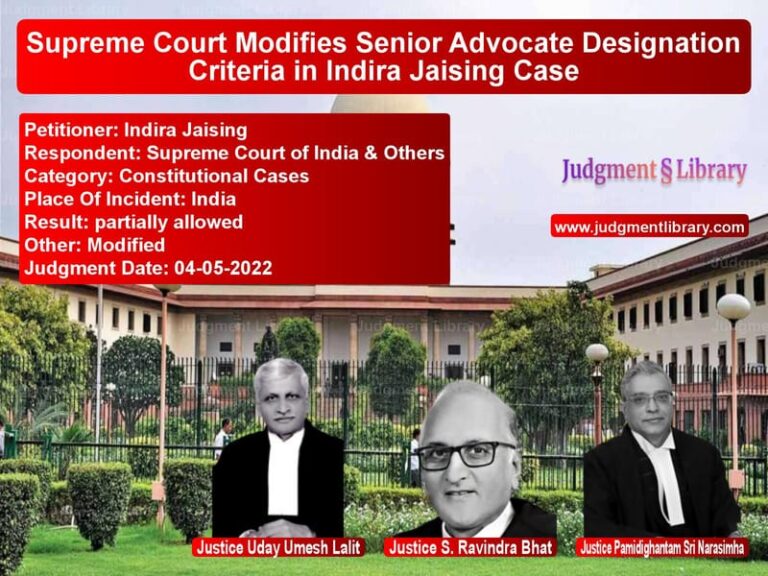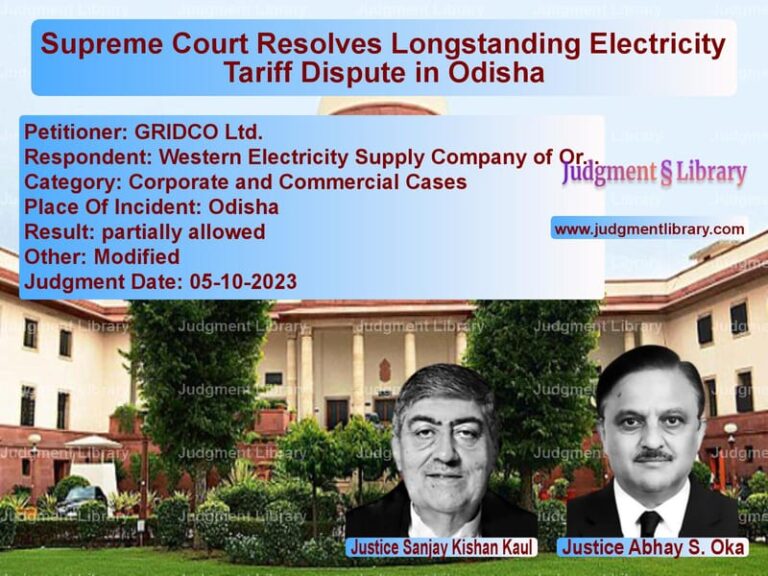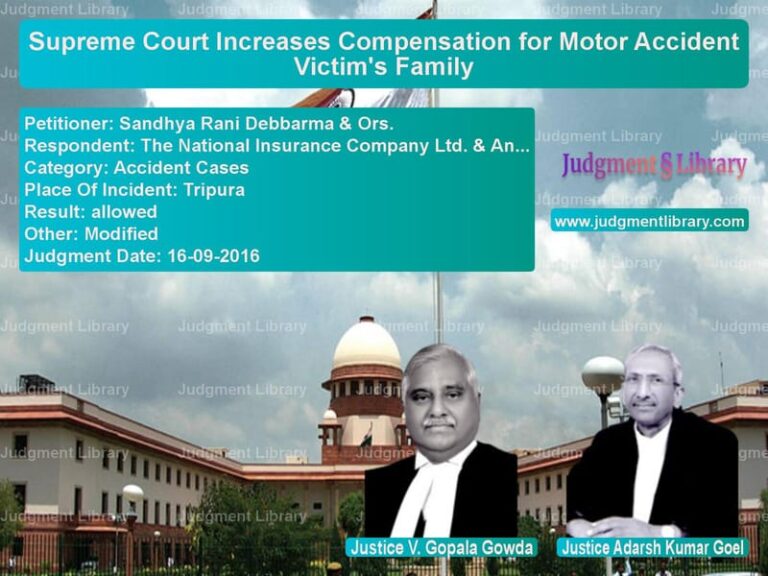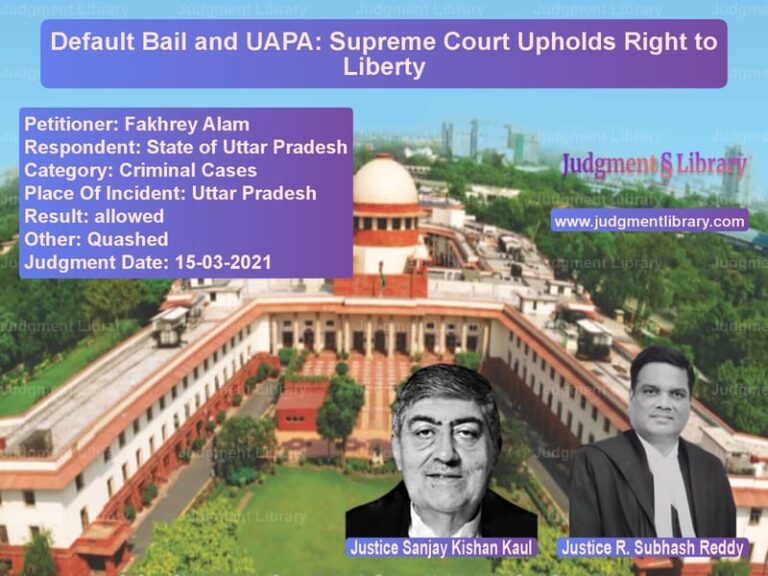Supreme Court Acquits Three Convicts in 2003 Punjab Murder Case Due to Lack of Evidence
The Supreme Court of India has acquitted three individuals convicted in a 2003 double murder case in Punjab. The Court ruled that the prosecution failed to establish the accused’s guilt beyond a reasonable doubt. The decision underscores the importance of robust evidence in securing convictions, particularly in cases where witness testimonies are inconsistent.
Background of the Case
The case involved the murder of Pratap Singh and his wife, Gurpal Kaur, who were attacked in their home in the early hours of July 4, 2003. The accused, Kishore, Bala, and Banaras, along with two others, were charged under various sections of the Indian Penal Code (IPC), including:
- Section 148 – Rioting, armed with a deadly weapon
- Section 460 – House trespass while committing an offense punishable with death
- Section 302 – Murder
- Section 149 – Unlawful assembly
The trial court convicted all five accused and sentenced them to life imprisonment. The Punjab and Haryana High Court later acquitted two of the accused but upheld the conviction of the three appellants, who then approached the Supreme Court.
Arguments by the Appellants
The defense presented several arguments challenging the prosecution’s case:
- The accused were convicted based on the testimonies of two eyewitnesses, PW-8 (Khushbir Singh) and PW-9 (Narinder Kaur), who were inconsistent in their statements.
- No test identification parade was conducted, despite the fact that the witnesses did not know the accused before the incident.
- The most crucial witnesses, Lovepreet Kaur and Amritpal Kaur, who first raised the alarm, were not examined.
- Another injured witness, Satbir Singh, was also not called to testify.
- Recovered stolen ornaments, allegedly from the accused, were not properly identified, as the investigating officer failed to prove their origin.
Arguments by the Respondent (State of Punjab)
The prosecution maintained that:
- PW-8 and PW-9 had ample opportunity to see the accused during the attack.
- Since the accused were identified in court within a year of the incident, a test identification parade was unnecessary.
- Eyewitness testimonies corroborated the police investigation, confirming the accused’s involvement.
Supreme Court’s Observations
The Supreme Court reviewed the case and found serious lapses in the prosecution’s evidence:
- There was no unlawful assembly as required under Section 149 IPC because two out of five accused had been acquitted.
- PW-8 and PW-9 were inconsistent in their testimonies and did not explicitly state that they saw the accused attack the deceased.
- The prosecution failed to examine key witnesses, including the two young girls who first noticed the attackers and an injured witness.
- The prosecution did not prove that the stolen ornaments recovered from the accused were the same as those belonging to the victims.
The Court ruled:
“It is difficult to connect any accused with the injuries sustained by the deceased in the absence of any cogent evidence. Therefore, it is not possible to uphold the conviction under Section 302 IPC.”
Final Judgment and Release
The Supreme Court overturned the High Court’s ruling and acquitted the three appellants. The Court noted that the accused had already served over seven years in prison, and given the weak evidence against them, their conviction could not stand.
Legal Implications of the Judgment
This ruling highlights several critical legal principles:
- Reliability of Witness Testimonies: Convictions cannot be based on inconsistent or incomplete witness statements.
- Need for Test Identification Parades: If witnesses do not know the accused before the incident, a test identification parade is crucial for fair trial proceedings.
- Burden of Proof on Prosecution: The State must provide compelling evidence to secure a conviction, rather than relying on circumstantial evidence.
- Protection of Accused Rights: If an accused has already served a substantial portion of their sentence based on flawed evidence, courts must ensure justice through acquittal.
Conclusion
The Supreme Court’s decision in this case reinforces the fundamental principle that an accused cannot be convicted based on weak and insufficient evidence. The ruling serves as an important reminder for law enforcement and the judiciary to ensure that convictions are secured through due process and conclusive proof.
Petitioner Name: Kishore & Ors..Respondent Name: State of Punjab.Judgment By: Justice Abhay S. Oka, Justice Ujjal Bhuyan.Place Of Incident: Punjab.Judgment Date: 07-02-2024.
Don’t miss out on the full details! Download the complete judgment in PDF format below and gain valuable insights instantly!
Download Judgment: kishore-&-ors.-vs-state-of-punjab-supreme-court-of-india-judgment-dated-07-02-2024.pdf
Directly Download Judgment: Directly download this Judgment
See all petitions in Murder Cases
See all petitions in Bail and Anticipatory Bail
See all petitions in Judgment by Abhay S. Oka
See all petitions in Judgment by Ujjal Bhuyan
See all petitions in allowed
See all petitions in Quashed
See all petitions in supreme court of India judgments February 2024
See all petitions in 2024 judgments
See all posts in Criminal Cases Category
See all allowed petitions in Criminal Cases Category
See all Dismissed petitions in Criminal Cases Category
See all partially allowed petitions in Criminal Cases Category







